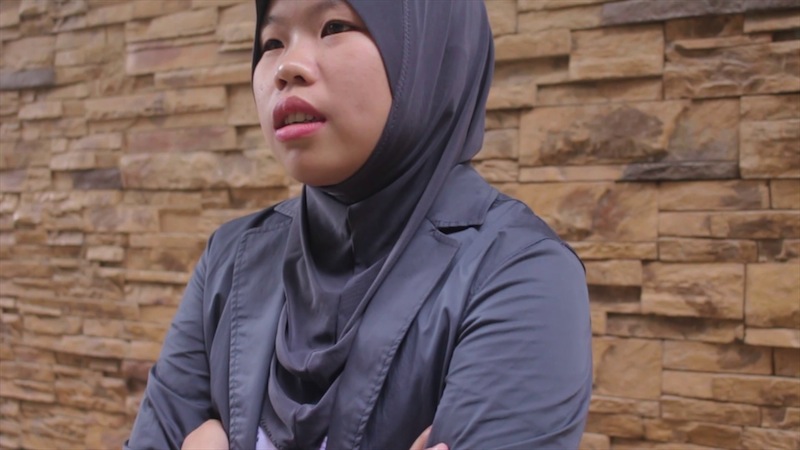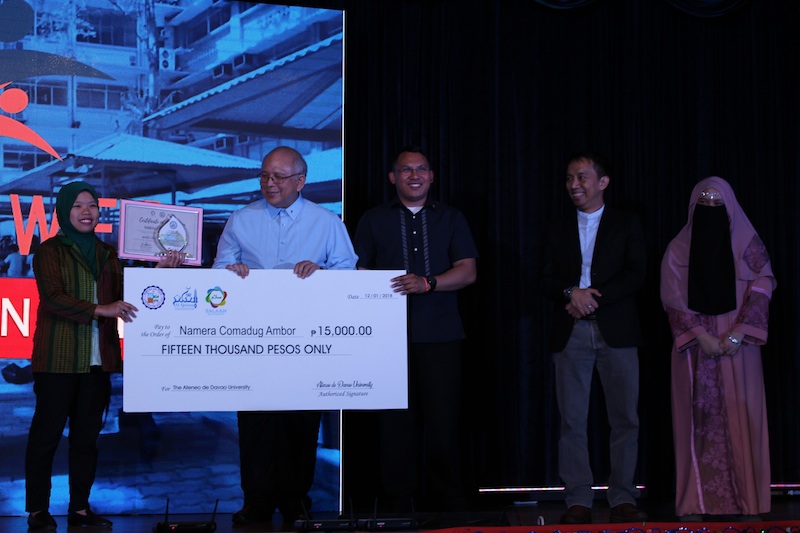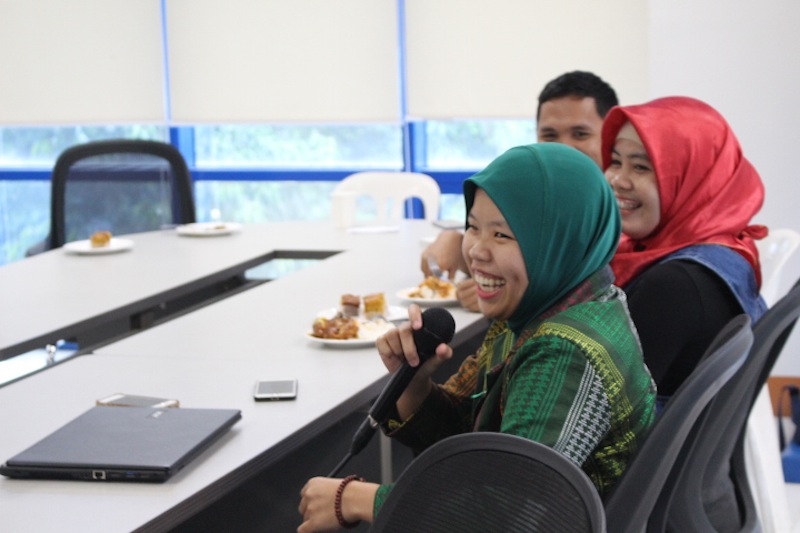WOMEN IN THE BANGSAMORO
Namera Ambor: “I want to feel good governance, peace and development in BARMM
by Kristelle Alina Rizardo
“Naniniwala ako sa kasabihan na walang taong bobo. Problema nga lang, sobra namang tamad.” (I believe in the saying that there are no stupid people. The only problem is laziness)
This statement describes Namera Comadug Ambor’s work ethic perfectly. A native of Taraka, Lanao del Sur, 24-year old Nam is best known in grassroots circles as one of the active volunteers in the Coalition of Moro Youth Movement (CMYM).
Her group aims to unify various Bangsamoro youth organizations with the common goal of sustaining peace and development; elevate the spirit of volunteerism; provide an inclusive environment advocating the vital role of youth in the peace process and to society in general; and inculcate Bangsamoro history.
The CMYM is focused on promoting Bangsamoro values to the youth in Lanao, Maguindanao and other areas what is now the Bangsamoro Autonomous Region in Muslim Mindanao (BARMM).
The role of the Bangsamoro youth — young women, in particular — is more critical than ever. However, the road to empowering them is not easy.
 Namera Ambor is passionate about the role of the youth and women in the Bangsamoro. Photo courtesy of Salaam Movement
Namera Ambor is passionate about the role of the youth and women in the Bangsamoro. Photo courtesy of Salaam Movement
Her own path to empowerment began with a simple question: Why?
“I started advocating Bangsamoro when I began to ask myself big questions like ‘Why am I Moro? Why am I Meranao? Why should I know the Bangsamoro Struggle? Is the youth the problem or the solution of this generation? Why should I know the true meaning of Jihad (struggle)?’” she articulates. As a young Moro, and a woman at that, being an advocate for the Bangsamoro can be a daunting challenge.
But not for Nam.
“Why does the youth need to participate in these discussions? I am not the child of someone from the Moro Islamic Liberation Front (MILF) or Moro National Liberation Front (MNLF) … I learned more about the aspirations of the Bangsamoro through participating in different peacebuilding talks, workshops, roundtable discussions, Bangsamoro youth caucuses, social media, reading books about the Bangsamoro struggle, research, and more.
A Passion For The Youth
As Bangsamoro youth, Nam has dedicated the rest of her life to the Bangsamoro. She is involved in issues that matter, such as Preventing / Countering Violent Extremism (P/CVE), Bangsamoro History, Bangsamoro Peace Process, Transitional Justice and Empowering Bangsamoro youth, in addition to her advocacy for the Bangsamoro Basic Law / Bangsamoro Organic Law, now Republic Act 11054 creating the BARMM.
“As a youth of Bangsamoro, we have so many initiatives in helping my region like organizing seminars, workshops, focus group discussions (FGD), peace building, capacity building, policy making for youth, information and education campaigns in the grassroots level, lobbying for the youth provisions in the Bangsamoro law, community services, serving as humanitarian volunteers during Butig war and Marawi siege. Lastly, we also educate them on topics on Bangsamoro History, the Bangsamoro Peace Process, Bangsamoro Organic Law and Transitional Justice,” Nam explains.
These initiatives have kept Nam her busy. She is the head organizer of the Moro Youth Peace Camp (MYPC), a four-day event held in Cotabato City where young members of the different Bangsamoro tribes gather to talk about issues close to their heart. She was in charge of seven out of eight batches, the most recent held on March 8 to 11.
MYPC participants come from the different tribes of the Bangsamoro like Meranao, Maguindanaon, Iranun, Yakan, Tausog and others. According to Nam, the camp provides an avenue for the Bangsamoro Youth to converge, organize, foster unity and build good working relationships among themselves; impart and explore peace initiatives in support of the new governance in the BARMM; advance the youth agenda in the BARMM; and encourage teamwork in preventing violent extremism.
 Moro youth leader Namera Ambor is awarded the MPower Award for Community-based Youth. With her, from left to right, is Fr. Joel E. Tabora, SJ, AdDU President; Undersecretary Ronald Cardema, Chie Executive Officer and Chairperson of the National Youth Commission; Datu Mussolini Sinsuat Lidasan, Bangsamoro Transition Commission member and Al Qalam Executive Director; and Fatima Star Lamalan, Program Coordinator for Salaam Movement. Photo by Kristelle Alina Rizardo
Moro youth leader Namera Ambor is awarded the MPower Award for Community-based Youth. With her, from left to right, is Fr. Joel E. Tabora, SJ, AdDU President; Undersecretary Ronald Cardema, Chie Executive Officer and Chairperson of the National Youth Commission; Datu Mussolini Sinsuat Lidasan, Bangsamoro Transition Commission member and Al Qalam Executive Director; and Fatima Star Lamalan, Program Coordinator for Salaam Movement. Photo by Kristelle Alina Rizardo
Her efforts in organizing and inspiring the community youth have not been in vain. In addition to her efforts in advocating for the Bangsamoro, she was awarded as one of the Most Outstanding Community Youth during the #MPower Awards, given out by the Salaam Movement of the Ateneo de Davao University on December 1, 2018.
The award was presented to her by Fr. Joel Tabora, SJ, Ateneo de Davao University President, and National Youth Commission chair Ronald Cardema.
The Women of the Bangsamoro
That same month, she was in Bangkok, Thailand to participate in an Expert Group Meeting with UN Women. The talk focused on issues such as populism, nationalism, and gender equality, which Nam has always been passionate about.
It is very important for Nam to have more young women involved in the Bangsamoro cause.
The hurdles that every Moro person has to face is a challenge that Nam, a graduate of BSEd Technology and Livelihood Education at the Mindanao State University in Marawi City and now taking up Master of Public Administration major in Organizational Management in the same university, takes head-on.
As a young Moro woman, she admits it was initially very hard to lobby for her advocacies “because some of our elders did not want to recognize our capacity and potential to help them. But, in the long run, they realized that in pursuing peace and development, young women, and the youth in the Bangsamoro region play a vital role in our society.”
Indeed, she said, “we need the guidance, experiences, wisdoms of our elders to sustain their struggle, as we are the second liners of their aspiration in the right to self-determination.”
As a hijabi, Nam is outspoken about breaking stereotypes. Last month, she was featured as one of 10 Outstanding Meranao hijabi during World Hijab Day in Iligan City. Alongside other women such as Teach Peace Build Peace Movement founder Bai Rohaniza Sumndad-Usman and Professor Yasmira Moner of the Mindanao State University-Iligan Institute of Technology, she spoke about how her choice to wear the hijab actually allows her more freedom to be herself.
“If you are a believing muslimah, you should cover yourself (in) outer garment in order to conceal your beauty (this is in accordance to Islam), so that you can save yourself from harm, so that you can be recognized as Muslim women, as chaste women, as women who are not out there ‘free for all,’ and women who are serious about modesty,” Nam adds.
For Peace and Development
For Nam, advocating for the Bangsamoro is not just work, but a way of life. Despite the hurdles she has surpassed, she remains steadfast and loyal to bringing together all walks of life, and for peace and development in the region.
What she especially wishes for is a government that reflects the hopes and dreams of the young men and women of the Bangsamoro. She is now active in pursuing the youth agenda of the Bangsamoro Transition Authority (BTA), the body that will govern the BARMM in the three-year transition period until June 30, 2022; as well as the youth’s assistance in the normalization process for the MILF combatants and internally displaced persons (IDP’s) in the BARMM.
 Namera Ambor of the Bangsamoro Youth Caucus speaks at its 2nd General Meeting in July 2018 at the Ateneo de Davao University. Photo by Kristelle Alina Rizardo
Namera Ambor of the Bangsamoro Youth Caucus speaks at its 2nd General Meeting in July 2018 at the Ateneo de Davao University. Photo by Kristelle Alina Rizardo
“As a Bangsamoro youth, I want to feel good governance, peace and development in BARMM, In shaa Allah… where the people are living prosperously and are enjoying the fruits of the peace efforts, or the jihad of our elders. (I also want) the next generation to never experience the dark years of the Bangsamoro.” She referred to the “dark years” as the period where the Bangsamoro lived in fear and became victims of injustice.
With the new parliamentary system under the BTA, she hopes for more accountability and transparency in governance. “I hope and pray that the BARMM leaders will look at the failures of the previous regional set-up as a lesson and as an inspiration to do good, and to deliver the promises of the peace agreement to the Bangsamoro people.”
Nam has high hopes for what the youth can do in the BARMM. “We need to support the BARMM in whatever way we can, even just to deliver the basic services for our people and to be a watchdog of this new BARMM government. We should also know the Bangsamoro organic law and the role of the BTA in implementing the law and beyond.”
Nam is a young woman ready to take on the challenges that the future Bangsamoro will face. Despite her achievements, she calls on the youth to remain humble and to participate in the democratic process, to ensure it benefits everyone.
“To my fellow Bangsamoro youth, we must always do what is good for our people. We must support the members of the BTA, in whatever means necessary,” Nam said, adding that if the BTA is successful, the youth also benefits “but if we do not support the BTA-BARMM, we will be the victims as we will feel the effect of their failures. That is why we must support them as long as we see that they are doing their best, and they have a general interest in the Bangsamoro people, not just one group or individual.”
When she means everyone, she means everyone. Although the BARMM is governed by a Muslim majority, Nam respects all religions, groups, and identities. “I stand for the right of the Christian settler, Indigenous Peoples and 13 tribes of the Bangsamoro. We must always have prayers and patience – sabr – for humanity. We must always be humble because this world is full of challenges. Be humble Bangsamoro youth, and May Allah guide us and protect us, ameen.”
(Kristelle Alina Rizardo, a graduate of BA Communication Arts at the University of the Philippines-Mindanao, is the Communications Specialist of the Al Qalam Institute of the Ateneo de Davao University. This piece is part of a series on Women in the Bangsamoro, produced by MIndaNews with support from the Embassy of Canada)
